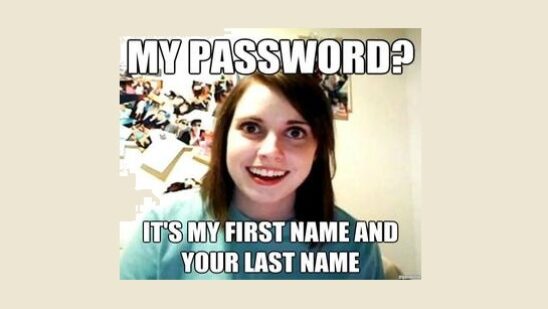
Create an image in your head; Paul McCartney wearing a sari and singing along to the tune of “Yellow Submarine” but with the lyrics modified to “we all live in socialist secular republic”. This may seem a little strange, but you can still remember the banking PIN that a friend gave me about three years ago, right? The image, which you have to admit is quite striking, helps you to remember two very specific dates, which in turn provides you with instant access to your friend’s worldly wealth, whenever you like. We believe this is a fairly common technique for remembering passwords and PINs, that of associating an image with the numbers or letters, even if we have taken it to some extremes. So how do you come up with some secure, safe, and reliable wildly imaginative computer passwords?
Problem Passwords
Problem passwords include names, pet names, house names, and silly sequences of numbers like 123456 or 123456789. These are not difficult to work out, for even the most average of hackers, and if you have had a computer virus, malware infection, or Trojan, these passwords can be easily worked out by anyone who has access to all areas passed to your computer.
Generating Your Password
Passwords need to be pretty random, odd, and irrelevant to your life. You can use a random password generator that will offer you up an obscure set of letters and numbers similar looking to zi3ro1nu5bo4zi1cu1ga18; this is great but has a downside in that it will be so obscure you’ll have little chance of hacking into your accounts and details.
Creating a memorable one doesn’t need to involve inappropriately dressed 60s pop stars and can be relatively easy; here’s one straightforward method.
- Think of a sentence that you can easily remember, such as, “My favorite color is red”. Then use the first letters from each word to get “mfcir”. Any easy-to-remember statement will do and it generates a delightfully meaningless set of characters that you’ll remember any time you need to.
- A decent password should be at least eight characters long and it should include a mixture of letters, numbers, or special characters. To transform the base password above to a more effective version you can easily add some memorable characters; “my favorite color is red!” becomes “mfcir!”, without much imagination yet remains random. At this point it can be safe to include some initials; your own, a relative, or a pet’s will do. This turns the password into “mfcir!jh”.
- Having magically achieved the required eight characters it makes sense to capitalize a couple. “Mfcir!jH” will certainly do, but the world is truly your oyster on this one and you can get as creative as you like.
- Passwords for different sites can be easily transformed by making them relevant to the site; your iTunes password can reflect your taste in music “my favorite band is Katchagoogoo” immediately becomes “Mfbik!jH”, or some such combination.
Reset the Computer Password More Often and Make it Random
Hopefully, this should help to make the art of easy, yet difficult to hack, passwords a little simpler. Remembering this type of password should be extremely easy and keeping to the basic formula means you can create multiple, apparently complex but easy-to-remember passwords, which you’ll not easily forget and won’t have to write down. It’s also a far preferable way to being cursed by images of Paul McCartney in a sari.
Password security is a crucial part of online security, along with keeping up to date with your virus protection. The latter is simple enough, while effective password creation requires a little imagination, although preferably not too much!
McAfee antivirus will help to protect your computer from infection, Spyware, and other troublesome visitors. Creating strong, effective passwords that you can easily remember is not always so straightforward but with a little illogical thinking, it can be easier than you might think.